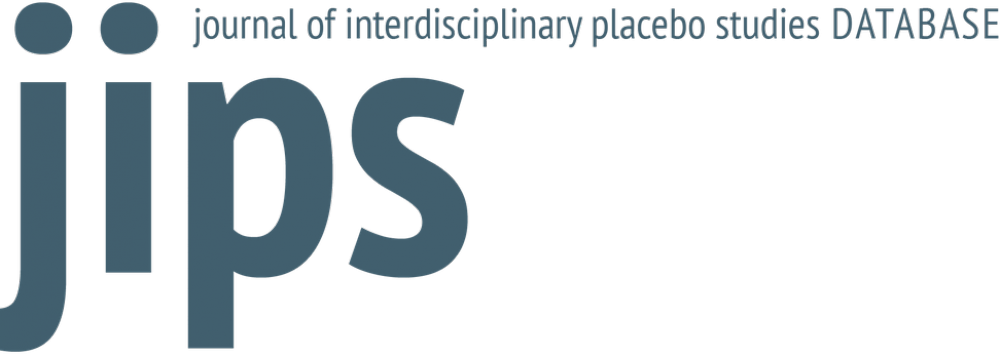Today we present 25 new placebo research papers, comments and abstracts identified during August 2018. As usual, they are based on new PUBMED publication using the search terms „placebo“ and „nocebo“ and are hand-selected from more than 629 new publications during the preceding month. Previously published monthly updates can be found in our archive. Todays selection as well as all previously identified papers will also go into our placebo research library that currently contains more than 4,000 relevant papers. If you would like to get access to the full database, please register for our newsletter and provide us with your email address and affiliation.
Aslaksen, P. M., Forsberg, J. T., & Gjerstad, J. (2018).
The Opioid Receptor Mu 1 (OPRM1) rs1799971 and Catechol-O-methyltransferase (COMT) rs4680 as genetic markers for placebo analgesia. Pain. doi:10.1097/j.pain.0000000000001370
https://www.ncbi.nlm.nih.gov/pubmed/30130297
Beedie, C., Benedetti, F., Barbiani, D., Camerone, E., Cohen, E., Coleman, D., Davis, A., Elsworth-Edelsten, C., Flowers, E., Foad, A., Harvey, S., Hettinga, F., Hurst, P., Lane, A., Lindheimer, J., Raglin, J., Roelands, B., Schiphof-Godart, L., & Szabo, A. (2018).
Consensus statement on placebo effects in sports and exercise: The need for conceptual clarity, methodological rigour, and the elucidation of neurobiological mechanisms. Eur J Sport Sci, 1-7. doi:10.1080/17461391.2018.1496144
https://www.ncbi.nlm.nih.gov/pubmed/30114971
Braithwaite, F. A., Walters, J. L., Li, L. S. K., Moseley, G. L., Williams, M. T., & McEvoy, M. P. (2018).
Effectiveness and adequacy of blinding in the moderation of pain outcomes: Systematic review and meta-analyses of dry needling trials. PeerJ, 6, e5318. doi:10.7717/peerj.5318
https://www.ncbi.nlm.nih.gov/pubmed/30083458
Eliav, E. (2018).
Editorial: Placebo analgesia in dentistry. Quintessence Int, 49(8), 605. doi:10.3290/j.qi.a40935
https://www.ncbi.nlm.nih.gov/pubmed/30109308
Engels, S., Treiber, C. D., Salzer, M. C., Michalik, A., Ushakova, L., Keays, D. A., Mouritsen, H., & Heyers, D. (2018).
Lidocaine is a nocebo treatment for trigeminally mediated magnetic orientation in birds. J R Soc Interface, 15(145). doi:10.1098/rsif.2018.0124
https://www.ncbi.nlm.nih.gov/pubmed/30089685
Fiorio, M., Emadi Andani, M., Recchia, S., & Tinazzi, M. (2018).
The somatosensory temporal discrimination threshold changes after a placebo procedure. Exp Brain Res. doi:10.1007/s00221-018-5357-5
https://www.ncbi.nlm.nih.gov/pubmed/30109375
Flaten, M. A., Bjorkedal, E., Lyby, P. S., Figenschau, Y., & Aslaksen, P. M. (2018).
Failure to Find a Conditioned Placebo Analgesic Response. Front Psychol, 9, 1198. doi:10.3389/fpsyg.2018.01198
https://www.ncbi.nlm.nih.gov/pubmed/30104988
Gaab, J. (2018).
The placebo and its effects: A psychoneuroendocrinological perspective. Psychoneuroendocrinology. doi:10.1016/j.psyneuen.2018.08.008
https://www.ncbi.nlm.nih.gov/pubmed/30098833
Gross, A. L., Chu, N., Anderson, L., Glymour, M. M., Jones, R. N., & Coalition Against Major Diseases. (2018).
Do people with Alzheimer’s disease improve with repeated testing? Unpacking the role of content and context in retest effects. Age Ageing. doi:10.1093/ageing/afy136
https://www.ncbi.nlm.nih.gov/pubmed/30124777
Howick, J., & Hoffmann, T. (2018).
How placebo characteristics can influence estimates of intervention effects in trials. CMAJ, 190(30), E908-E911. doi:10.1503/cmaj.171400
https://www.ncbi.nlm.nih.gov/pubmed/30061325
Jose, J., & AlHajri, L. (2018).
Potential negative impact of informing patients about medication side effects: a systematic review. Int J Clin Pharm. doi:10.1007/s11096-018-0716-7
https://www.ncbi.nlm.nih.gov/pubmed/30136054
Koretz, R. L. (2018).
JPEN Journal Club 37. Placebos and Nocebos. JPEN J Parenter Enteral Nutr. doi:10.1002/jpen.1429
https://www.ncbi.nlm.nih.gov/pubmed/30117536
Leibowitz, K. A., Hardebeck, E. J., Goyer, J. P., & Crum, A. J. (2018).
Physician Assurance Reduces Patient Symptoms in US Adults: an Experimental Study. J Gen Intern Med. doi:10.1007/s11606-018-4627-z
https://www.ncbi.nlm.nih.gov/pubmed/30128787
Linde, K., Atmann, O., Meissner, K., Schneider, A., Meister, R., Kriston, L., & Werner, C. (2018).
How often do general practitioners use placebos and non-specific interventions? Systematic review and meta-analysis of surveys. PLoS One, 13(8), e0202211. doi:10.1371/journal.pone.0202211
https://www.ncbi.nlm.nih.gov/pubmed/30142199
Meyer, B., Yuen, K. S. L., Saase, V., & Kalisch, R. (2018).
The Functional Role of Large-scale Brain Network Coordination in Placebo-induced Anxiolysis. Cereb Cortex. doi:10.1093/cercor/bhy188
https://www.ncbi.nlm.nih.gov/pubmed/30124792
Ongaro, G., & Kaptchuk, T. J. (2018).
Symptom perception, placebo effects and the Bayesian brain. Pain. doi:10.1097/j.pain.0000000000001367
https://www.ncbi.nlm.nih.gov/pubmed/30086114
Petrie, K. J., & Rief, W. (2018).
Psychobiological Mechanisms of Placebo and Nocebo Effects: Pathways to Improve Treatments and Reduce Side Effects. Annu Rev Psychol. doi:10.1146/annurev-psych-010418-102907
https://www.ncbi.nlm.nih.gov/pubmed/30110575
Pouillon, L., Socha, M., Demore, B., Thilly, N., Abitbol, V., Danese, S., & Peyrin-Biroulet, L. (2018).
The nocebo effect: a clinical challenge in the era of biosimilars. Expert Rev Clin Immunol. doi:10.1080/1744666X.2018.1512406
https://www.ncbi.nlm.nih.gov/pubmed/30118338
Rezk, M. F., & Pieper, B. (2018).
Correction to: To See or NOsee: The Debate on the Nocebo Effect and Optimizing the Use of Biosimilars. Adv Ther. doi:10.1007/s12325-018-0768-z
https://www.ncbi.nlm.nih.gov/pubmed/30097886
Rossettini, G., Emadi Andani, M., Dalla Negra, F., Testa, M., Tinazzi, M., & Fiorio, M. (2018).
The placebo effect in the motor domain is differently modulated by the external and internal focus of attention. Sci Rep, 8(1), 12296. doi:10.1038/s41598-018-30228-9
https://www.ncbi.nlm.nih.gov/pubmed/30115945
Smits, R. M., Veldhuijzen, D. S., Wulffraat, N. M., & Evers, A. W. M. (2018).
The role of placebo effects in immune-related conditions: mechanisms and clinical considerations. Expert Rev Clin Immunol. doi:10.1080/1744666X.2018.1516144
https://www.ncbi.nlm.nih.gov/pubmed/30139289
Trivedi, M. H., South, C., Jha, M. K., Rush, A. J., Cao, J., Kurian, B., Phillips, M., Pizzagalli, D. A., Trombello, J. M., Oquendo, M. A., Cooper, C., Dillon, D. G., Webb, C., Grannemann, B. D., Bruder, G., McGrath, P. J., Parsey, R., Weissman, M., & Fava, M. (2018).
A Novel Strategy to Identify Placebo Responders: Prediction Index of Clinical and Biological Markers in the EMBARC Trial. Psychother Psychosom, 1-11. doi:10.1159/000491093
https://www.ncbi.nlm.nih.gov/pubmed/30110685
van Gelder, T. (2018).
Placebo-induced Immunosuppression: A Game Changer? Transplantation, 102(9), 1402-1403. doi:10.1097/TP.0000000000002345
https://www.ncbi.nlm.nih.gov/pubmed/30124630
Witek, N., Stebbins, G. T., & Goetz, C. G. (2018).
What influences placebo and nocebo responses in Parkinson’s disease? Mov Disord. doi:10.1002/mds.27416
https://www.ncbi.nlm.nih.gov/pubmed/30132980
Zunhammer, M., Bingel, U., Wager, T. D., & Placebo Imaging Consortium. (2018).
Placebo Effects on the Neurologic Pain Signature: A Meta-analysis of Individual Participant Functional Magnetic Resonance Imaging Data. JAMA Neurol. doi:10.1001/jamaneurol.2018.2017
https://www.ncbi.nlm.nih.gov/pubmed/30073258
